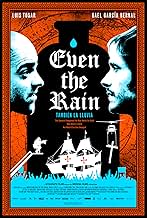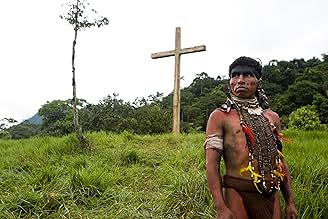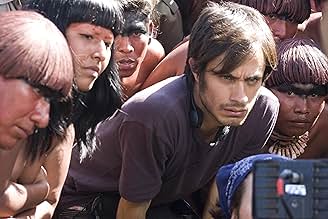As a director and his crew shoot a controversial film about Christopher Columbus in Cochabamba, Bolivia, local people rise up against plans to privatize the water supply.As a director and his crew shoot a controversial film about Christopher Columbus in Cochabamba, Bolivia, local people rise up against plans to privatize the water supply.As a director and his crew shoot a controversial film about Christopher Columbus in Cochabamba, Bolivia, local people rise up against plans to privatize the water supply.
- Awards
- 22 wins & 17 nominations total
- Director
- Writer
- All cast & crew
- Production, box office & more at IMDbPro
7.415.4K
1
2
3
4
5
6
7
8
9
10
Featured reviews
Whitey On The Moon
EVEN THE RAIN, directed by Icíar Bollaín, is a compelling film which attempts to explore the history of global economics using a kind of cinematic metaphor. Bollain's film focuses on a multinational movie crew that travels to Bolivia to make a film about Christopher Columbus, and examines his agenda of religious, cultural, and monetary exploitation of The New World. The production company hits a snag when locally violent demonstrations breakout against corporate ownership of indigenous water rights, and threaten to make the completion of the film impossible. The movie shows that the issues of wealth, ownership, and power are just as contentious today as they were five hundred years ago. Corporate giants of our era employ the same greedy strategy in an attempt to steal wealth, power, and access from the uninformed and defenseless. Although the ethical issues in the film are sometimes presented in a slightly heavy-handed manner, by the end of the feature, it is evident that the application of rapacious economic policy hasn't changed much since monarchs ruled the world.
correlation between conquistadors and corporations
I first got wind of the political situation in Bolivia around the time of the 2003 protests, and then during the 2005 presidential election that brought coca farmer Evo Morales to power, making him the country's first indigenous president. Oliver Stone's documentary "South of the Border" partly told the story of the World Bank-inspired water privatization in Bolivia: the World Bank forced Bolivia's government to pass a law making it illegal for people to collect rain in buckets since it would have broken the monopoly on water ownership.
Icíar Bollaín's "También la lluvia" ("Even the Rain" in English) tells the story of the privatization, contrasting it with Christopher Columbus's genocide against the Indians. Filmmakers Sebastian (Gael García Bernal) and Costa (Luis Tosar) arrive in Cochabamba to make a movie about Columbus's arrival in the Americas, and the Taino Indians' subsequent rebellion against the occupation. But the events depicted in their movie begin to play out in real life: when the government sets out to privatize the water supply, the actor playing Taino leader Hatuey is one of the leaders of the protests.
The movie - which is dedicated to Howard Zinn - obviously has as its main purpose to show the parallels between indigenous resistance 500 years ago and today. But more than anything, it should offer incite into the roots of the wave of progressive leaders who rose to power in South America during the first decade of the 21st century. I definitely recommend it.
Icíar Bollaín's "También la lluvia" ("Even the Rain" in English) tells the story of the privatization, contrasting it with Christopher Columbus's genocide against the Indians. Filmmakers Sebastian (Gael García Bernal) and Costa (Luis Tosar) arrive in Cochabamba to make a movie about Columbus's arrival in the Americas, and the Taino Indians' subsequent rebellion against the occupation. But the events depicted in their movie begin to play out in real life: when the government sets out to privatize the water supply, the actor playing Taino leader Hatuey is one of the leaders of the protests.
The movie - which is dedicated to Howard Zinn - obviously has as its main purpose to show the parallels between indigenous resistance 500 years ago and today. But more than anything, it should offer incite into the roots of the wave of progressive leaders who rose to power in South America during the first decade of the 21st century. I definitely recommend it.
A great movie tangled the present with the past
This is a great movie; a movie inside another movie, a movie out of another movie. Told a story when the Spaniards under the command of Christopher Columbus brutalized and ransacked Bolivia, then the government was bought out and mustered in the big corporate came in modern time to raped the country, took away the local people's water resource, the well, the water supply. Just like what the demonstrators said: "They need the vapor from our breaths, the sweat on our brows, they even want to take the rain dropping from the sky(Even The Rain)". The third storyline is the movie company that wanted to take advantage of the poor country's poverty and high unemployment, getting the cheap labors to shoot the movie. "The truth got many enemy, the lie got many friends", "You don't understand, water is our life", these dialog are so profound and true. Unfortunately, the movie crew was in the wrong time and at the wrong place encountered the explosion of the street riots and the demonstrations. This is a very complicated movie but shot so well to portray all the involving parties and single person got their own demons, dilemmas, tensions, numbness, helplessness, and hopelessness,self-denial, cowardice, depression and frustrations. The complexity of this movie was so vividly painted on the big screen. This is a great movie.
Movie within a movie, and parallels from Columbus to modern Bolivia
Even the Rain (2010)
There are so many stunning, powerful, dramatic, believable moments to this hard hitting film, you wish so much that there weren't a few unreasonable gaffes to the plot and characters. It's frustrating when a film is almost amazing, because you are reminded of what it was not.
But also what it is, which is pretty thrilling and clever.
First, the contemporary setting is based quite closely on the true events of local Bolivians in the third largest city of the country, Cochabamba, fighting for rights to their own water supply. A private (Euro-U.S.) firm has cornered water rights and when the locals try to use their own handmade supply system the police come and interfere. It's maddening to the point of anger on both sides of the screen. In a way, this local uprising against injustice is the movie, the core of the events.
But what makes it actually fabulous is the way it told through the eyes and cameras of a large film crew working on a movie about Christopher Columbus arriving on the shores of America and mistreating the natives. Yes, a parallel that is obvious but handled with dramatic aplomb. There are many moments showing the shooting of the film, and it transports the viewer instantly and beautifully to the Columbus events, which are epic in their own way. But the characters are part professional actors from other countries and part local (and underpaid) extras, some of whom are involved in the water protests when not filming.
So there are several layers of action, tightly interwoven. The disdain and fear of some of the outsiders is believable (the man playing Columbus, Karra Elejalde, is amazing, world weary and tough, taking both sides as needed). Some of the circa 1500 history of resistance by the natives and even the brave defense of the natives by a Spanish priest is inspiring. And the way it still applies 500 years later (500 years!) is depressing. And energizing.
There are some other small problems, maybe the result of editing down too much later, such as the inclusion at the start of black and white video footage, a documentation of the filming, that you think will then become news footage (or not) but then it just disappears as a component of the film, completely, for no reason. And then the tumult of the last half hour with riots and roadblocks is great stuff, really well done, but so highly improbable you have to just write it off to generous screen writing. We aren't really able to believe the wholehearted change of attitude of the producer (played with intensity by Luis Tosar), but it makes for great interpersonal (and sympathetic) dramatics. And finally the director of the movie within the movie is played by the ever beautiful Gael Garcia Bernal, but in fact he's too weak and thoughtful a type to be directing this sprawling and frankly unmanageable movie about Columbus.
But these objections actually only came up for me later, thinking back. While immersed, I was really immersed and impressed. It's an ambitious, smart, and pertinent movie, with great and enjoyable complexity.
There are so many stunning, powerful, dramatic, believable moments to this hard hitting film, you wish so much that there weren't a few unreasonable gaffes to the plot and characters. It's frustrating when a film is almost amazing, because you are reminded of what it was not.
But also what it is, which is pretty thrilling and clever.
First, the contemporary setting is based quite closely on the true events of local Bolivians in the third largest city of the country, Cochabamba, fighting for rights to their own water supply. A private (Euro-U.S.) firm has cornered water rights and when the locals try to use their own handmade supply system the police come and interfere. It's maddening to the point of anger on both sides of the screen. In a way, this local uprising against injustice is the movie, the core of the events.
But what makes it actually fabulous is the way it told through the eyes and cameras of a large film crew working on a movie about Christopher Columbus arriving on the shores of America and mistreating the natives. Yes, a parallel that is obvious but handled with dramatic aplomb. There are many moments showing the shooting of the film, and it transports the viewer instantly and beautifully to the Columbus events, which are epic in their own way. But the characters are part professional actors from other countries and part local (and underpaid) extras, some of whom are involved in the water protests when not filming.
So there are several layers of action, tightly interwoven. The disdain and fear of some of the outsiders is believable (the man playing Columbus, Karra Elejalde, is amazing, world weary and tough, taking both sides as needed). Some of the circa 1500 history of resistance by the natives and even the brave defense of the natives by a Spanish priest is inspiring. And the way it still applies 500 years later (500 years!) is depressing. And energizing.
There are some other small problems, maybe the result of editing down too much later, such as the inclusion at the start of black and white video footage, a documentation of the filming, that you think will then become news footage (or not) but then it just disappears as a component of the film, completely, for no reason. And then the tumult of the last half hour with riots and roadblocks is great stuff, really well done, but so highly improbable you have to just write it off to generous screen writing. We aren't really able to believe the wholehearted change of attitude of the producer (played with intensity by Luis Tosar), but it makes for great interpersonal (and sympathetic) dramatics. And finally the director of the movie within the movie is played by the ever beautiful Gael Garcia Bernal, but in fact he's too weak and thoughtful a type to be directing this sprawling and frankly unmanageable movie about Columbus.
But these objections actually only came up for me later, thinking back. While immersed, I was really immersed and impressed. It's an ambitious, smart, and pertinent movie, with great and enjoyable complexity.
Idealist director and stingy producer go to Bolivia to direct a film about iconic figures
As a director named Sebastian (Gael Garcia Bernal)and his crew formed by his executive producer named Costa (Luis Tosar) and actors realize a controversial film about Christopher Columbus (Karra Elejalde) Bartolome De Las Casas (Raul Arevalo) , Montesinos (Carlos Santos) in Cochabamba , Bolivia, local people rise up against schemes to privatize the water supply . Spain Conquered the New World for Gold 500 Years Later, Water is Gold Not Much Else has Changed. Costa has chosen this place because the budget of the film is tight and extras are cheap , as he hires a rebel native (Iduviri) . The only thing that matters to him is his professional pride as a producer that the film is made on time and within budget.
This is an interesting and thought-provoking film dealing with actual and past deeds as the first explorations and the way the Spaniards treated the Indians at the time, the Cochabamba revolts , being well interwoven by screenwriter Paul Laverty and director . Top-notch main cast such as Gael Garcia Bernal as a good , idealist filmmaker and Luis Tosar as a selfish producer who wishes hire supernumeraries, local actors and extras on the cheap . Very good cinematography by Alex Catalan . Emotive and sensitive musical score by Alberto Iglesias .
The real events in which this brooding movie are based result to be the following : The Cochabamba protests of 2000, also known as the "Cochabamba Water Wars", were a series of protests that took place in Cochabamba, Bolivia's third largest city, between January 1999 and April 2000 in response to multinational participation in the infrastructure and management of the city's municipal water supply. Demonstrations erupted when Aguas del Tunari imposed a large rate increase, reportedly to finance a Dam project, a week after taking control of the Cochabamba water supply system. In a country where the minimum wage was less than US$70 per month, many dwellers were hit with monthly water bills of $20 or more. Starting in early January 2000 massive protests in Cochabamba began with Oscar Olivera among the most outspoken leaders against the rate hikes and subsequent water cut-offs. The demonstrators consisted of peasant Irrigators who entered the city either under village banners, or carrying the Wiphala; they were joined by retired . Young men began to try to take over the plaza and a barricade across incoming roadways was set up. Soon they were joined by pieceworkers, sweatshop employees, and street vendors . Anarchists from the middle-classes came from the University of Cochabamba to denounce the World Bank and International Monetary Fund and neoliberalism. The strongest supporters of the demonstration were drawn from the city's growing population of homeless street children .Protesters were able to halt Cochabamba's economy by holding a general strike that shut down the city for four straight days. A ministerial delegation went to Cochabamba and agreed to roll back the water rates; still the demonstration continued.On February 4, 2000, thousands marching in protest were met by troops and law enforcement . Almost 200 demonstrators were arrested; 70 protesters and 51 policemen were injured.Throughout March 2000 the Bolivian hierarchy of the Roman Catholic Church tried to mediate between the government and the demonstrators. In the meantime, the Coordinadora made their own referendum and declared that out of fifty thousand votes, 96% demanded the contract with Aguas del Tunari be cancelled. The government's reply under Hugo Banzer was that "There is nothing to negotiate.In April 2000, demonstrators again took over Cochabamba's central plaza. When the leaders of the Coordinadora went to a meeting with the governor at his office they were arrested. Though they were released the following day, some, fearing further government action, fled into hiding. More demonstration leaders were arrested, with some being transferred to a jungle prison in San Joaquin, a remote town in the Amazon rain forest on the border with Brazil. The demonstrations spread quickly to other areas including La Paz, Oruro, and Potosí as well as rural areas. The protesters also expanded their demands calling on the government to resolve unemployment and other economic problems.Soon demonstrators had most of the major highways in Bolivia barricaded. The protest even inspired officers in four La Paz police units to refuse to leave their barracks or obey superiors until a wage dispute was settled.
The motion picture is originally directed by Iciar Bollain . She has worked as a leading actress in selected films like The South (1983) by 'Victor Erice', Malaventura (1988) by 'Manuel Gutiérrez Aragon , Land and Freedom (1995) by Ken Loach, it became an acclaimed audience's and critics' choice ; Leo (2000) by 'Jose Luis Borau' that won the Best Actress nomination Goya Spanish Academy Awards and Nos Miran (2002) . She is a prestigious producer , writing and directing since then both documentaries and fiction films. In 1995, she wrote and directed her feature film debut, ¨Hola, ¿estás Sola?¨ (1995), awarded with Best New Director in Valladolid Festival and was nominated for Best Directorial Debut by the Spanish Film Academy. The film became one of Spain's 1996 box office hits. Flowers from another world(1999), was her second feature film and was awarded at Cannes Film Festival 1999, Best Film in the International Critics' Week ; ¨Take my eyes, 2003¨, was her following film as writer and director, winner of 7 Goyas Spanish Academy Awards, including Best Film, among many other international awards. Her next feature film is ¨Mataharis (2007)¨ and is filming ¨Katmandu¨.
This is an interesting and thought-provoking film dealing with actual and past deeds as the first explorations and the way the Spaniards treated the Indians at the time, the Cochabamba revolts , being well interwoven by screenwriter Paul Laverty and director . Top-notch main cast such as Gael Garcia Bernal as a good , idealist filmmaker and Luis Tosar as a selfish producer who wishes hire supernumeraries, local actors and extras on the cheap . Very good cinematography by Alex Catalan . Emotive and sensitive musical score by Alberto Iglesias .
The real events in which this brooding movie are based result to be the following : The Cochabamba protests of 2000, also known as the "Cochabamba Water Wars", were a series of protests that took place in Cochabamba, Bolivia's third largest city, between January 1999 and April 2000 in response to multinational participation in the infrastructure and management of the city's municipal water supply. Demonstrations erupted when Aguas del Tunari imposed a large rate increase, reportedly to finance a Dam project, a week after taking control of the Cochabamba water supply system. In a country where the minimum wage was less than US$70 per month, many dwellers were hit with monthly water bills of $20 or more. Starting in early January 2000 massive protests in Cochabamba began with Oscar Olivera among the most outspoken leaders against the rate hikes and subsequent water cut-offs. The demonstrators consisted of peasant Irrigators who entered the city either under village banners, or carrying the Wiphala; they were joined by retired . Young men began to try to take over the plaza and a barricade across incoming roadways was set up. Soon they were joined by pieceworkers, sweatshop employees, and street vendors . Anarchists from the middle-classes came from the University of Cochabamba to denounce the World Bank and International Monetary Fund and neoliberalism. The strongest supporters of the demonstration were drawn from the city's growing population of homeless street children .Protesters were able to halt Cochabamba's economy by holding a general strike that shut down the city for four straight days. A ministerial delegation went to Cochabamba and agreed to roll back the water rates; still the demonstration continued.On February 4, 2000, thousands marching in protest were met by troops and law enforcement . Almost 200 demonstrators were arrested; 70 protesters and 51 policemen were injured.Throughout March 2000 the Bolivian hierarchy of the Roman Catholic Church tried to mediate between the government and the demonstrators. In the meantime, the Coordinadora made their own referendum and declared that out of fifty thousand votes, 96% demanded the contract with Aguas del Tunari be cancelled. The government's reply under Hugo Banzer was that "There is nothing to negotiate.In April 2000, demonstrators again took over Cochabamba's central plaza. When the leaders of the Coordinadora went to a meeting with the governor at his office they were arrested. Though they were released the following day, some, fearing further government action, fled into hiding. More demonstration leaders were arrested, with some being transferred to a jungle prison in San Joaquin, a remote town in the Amazon rain forest on the border with Brazil. The demonstrations spread quickly to other areas including La Paz, Oruro, and Potosí as well as rural areas. The protesters also expanded their demands calling on the government to resolve unemployment and other economic problems.Soon demonstrators had most of the major highways in Bolivia barricaded. The protest even inspired officers in four La Paz police units to refuse to leave their barracks or obey superiors until a wage dispute was settled.
The motion picture is originally directed by Iciar Bollain . She has worked as a leading actress in selected films like The South (1983) by 'Victor Erice', Malaventura (1988) by 'Manuel Gutiérrez Aragon , Land and Freedom (1995) by Ken Loach, it became an acclaimed audience's and critics' choice ; Leo (2000) by 'Jose Luis Borau' that won the Best Actress nomination Goya Spanish Academy Awards and Nos Miran (2002) . She is a prestigious producer , writing and directing since then both documentaries and fiction films. In 1995, she wrote and directed her feature film debut, ¨Hola, ¿estás Sola?¨ (1995), awarded with Best New Director in Valladolid Festival and was nominated for Best Directorial Debut by the Spanish Film Academy. The film became one of Spain's 1996 box office hits. Flowers from another world(1999), was her second feature film and was awarded at Cannes Film Festival 1999, Best Film in the International Critics' Week ; ¨Take my eyes, 2003¨, was her following film as writer and director, winner of 7 Goyas Spanish Academy Awards, including Best Film, among many other international awards. Her next feature film is ¨Mataharis (2007)¨ and is filming ¨Katmandu¨.
Did you know
- TriviaThe scene where the little girl sees herself on screen was kind of a self homage by director/actress Icíar Bollaín. She wanted to transmit her first impression when she saw herself on screen being a teenager.
- ConnectionsFeatured in Ebert Presents: At the Movies: Episode #1.6 (2011)
- How long is Even the Rain?Powered by Alexa
Details
Box office
- Gross US & Canada
- $518,017
- Opening weekend US & Canada
- $53,730
- Feb 20, 2011
- Gross worldwide
- $7,313,485
- Runtime
- 1h 43m(103 min)
- Color
- Sound mix
- Aspect ratio
- 2.35 : 1
Contribute to this page
Suggest an edit or add missing content
































